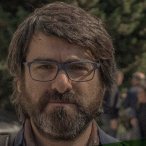English · Español

4 April 2018 | Interviews | Monitoring transnationals | Agroecology | Resisting neoliberalism | Forests and biodiversity | Human rights | Gender | Climate Justice and Energy | Food Sovereignty | Mano a Mano
Agroecology under discussion in Italy: the defense of an indigenous-peasant ancient practice against corporate opportunistic attacks
Download: MP3 (3.3 Mb)
Martín Drago, Food Sovereignty program coordinator at Friends of the Earth International (FoEI), said that the symposium on agroecology launched this Tuesday in Rome, Italy, by the United Nations Food and Agriculture Organization (FAO), will be a space of “hard discussion in terms of the meaning of agroecology”.
It will also include debates about “the public policies the people need in the territories in order to live in a dignified way, producing food, which is what they like”.
“There is no agroecology without social organizations in the territory, without farmers in the territory, without access to land, without respect to the rights of peasants and indigenous people to their seeds”, added the Uruguayan environmental activist. There is no question about it for Drago: “The system is broken. We need to transform it. The current food system highly contributes with climate change. It is concentrated and that is why it fails to feed the world. People living in poverty are the ones who produce food”.
FoEI is an environmental federation made up of grassroots organizations from 75 countries. From Tuesday to Thursday, the “Second International Symposium on Agroecology: scaling up agroecology to achieve the Sustainable Development Goals (SDGs)” will take place at the FAO´s headquarters in Rome.
According to the official website of the FAO, about 400 participants are expected to attend, from policy-makers and governments, agroecology practitioners and civil society representatives, to members from academia and research, among others. The goal is to promote agroecology of dialogue in regional and national activities and to facilitate an opportunity to exchange ideas, experiences and analyze policies and actions.
In the interview with Real World Radio conducted on Monday, Drago explained that there is a global movement for food sovereignty gathered in the “International Planning Committee for Food Sovereignty”. Peasant, indigenous, fisherfolk, women, youth, environmental organizations, among many others, participate here. In the framework of the Committee, the activist helps to facilitate the working group on agroecology, and this group considers that advocacy work at the FAO is key.
There, the social movements will continue denouncing the impacts of agribusiness, as they have been denouncing for years, and promoting food sovereignty and agroecology as key for the fulfilment of the right of peoples to food.
Drago regretted that the FAO “is a machine that serves to promote industrial agriculture”, the agribusiness model, but he recognized that social movements and organizations have been capable in the past period to position their thoughts, questions and proposals there.
Along this line he considered that “governments need to listen to the people” in this intergovernmental space. He added that small-scale farmers organizations, different social movements, demand “to be part of the entire public policy making process” around agriculture and food, “from the initial thoughts to its implementation and monitoring”. “Peasants, indigenous people, artisanal fisherfolk are the ones who produce food. Public policies cannot be built without them”.
Drago also explained that “agroecology is not made at the FAO”, and that this organization “won´t define what social movements believe agroecology means”, because “agroecology is an ancient construction of peasants and indigenous people. It is not a construction of science (…)”, he explained. “We are here to try to influence the FAO recommendations for governments to implement public policies to transform a food system that is broken”, he stated. “The food sovereignty movement has solutions that are not imaginary or designed in an office. They come from concrete practices in concrete territories and are carried out on a daily basis”, he said.
The FoEI representative also made reference to the publication “Community Forest Management and Agroecology. Links and Implications”, launched last week by the environmental federation and promoted in the framework of this international symposium of the FAO in Rome. Drago stated that this is a work that provides solutions to the crisis, because “peoples organize their solutions daily; there are paths, and these paths are in the people, in the territories”. There are solutions, “that sometimes feel divided, but which help build a more holistic, more general view of how to transform the system that we consider broken”, he concluded.
Imagen: Real World Radio







